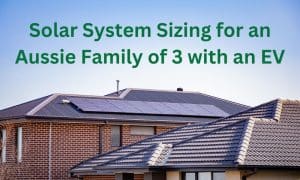Living in Australia offers a perfect combination – a sunny climate and a growing emphasis on renewable energy. This makes solar power a highly attractive option, particularly for retired couples looking to reduce their electricity bills and embrace a sustainable lifestyle.
However, choosing the right solar setup can feel overwhelming, considering various system sizes and components. This article will guide you through the factors influencing your ideal solar system size for a comfortable retirement, including solar panels in Australia, batteries, and even an EV charger for your electric vehicle.
Ready to upgrade your solar systems and take your energy savings to the next level? Embrace the energy efficiency revolution by upgrading your solar systems and adding a battery or solar inverters with Energy Matters.
With our 3 free solar quotes, you can compare plans from pre-qualified and vetted installers in your area and find the perfect solution for your home and business. Harness the sun’s power and save money on electricity bills while reducing environmental impact. Let Energy Matters guide you towards a brighter, more sustainable future.
Understanding your energy needs: The foundation of choosing a system size
The most crucial aspect of determining your solar system size hinges on your daily energy consumption. Here’s how to get a clear picture:
- Review your electricity bills: Look for the “daily average usage” section or divide your monthly bill by the number of days to find your average daily kWh (kilowatt-hours) usage.
- Lifestyle analysis: Do you spend most of your time at home with the air conditioner running? This will affect your consumption.
- Consider future needs: Consider potential changes in your lifestyle. Will you be running appliances more frequently after retirement? Are you planning on purchasing an electric vehicle (EV)? Factor in this additional usage when calculating your needs.
Here’s a general guideline for retired couples in Australia:
Low usage (under 15 kWh/day)
Ideal for couples with efficient appliances and minimal daytime usage. A system size of 4-5 kW might suffice.
Medium usage (15-20 kWh/day)
This is a common range for most households. A 6-8 kW system could be suitable.
High usage (above 20 kWh/day)
This could be due to pool pumps, electric hot water systems, or frequent EV charging. You might require a system exceeding 8 kW.
Remember: These are estimations. It is highly recommended that you consult a reputable solar installer who can analyse your specific needs.
Ready to take control of your energy bills and switch to solar? Contact Energy Matters today, and we’ll connect you with up to 3 FREE solar quotes from trusted local solar installers!
Read more about:
- How Many Panels in a 6.6kw Solar System
- 6000 Watt Solar Panels | 6kW Solar Panel System
- 7000 Watt Solar Panels | 7kW Solar Panel System
- 8000 Watt Solar Panels | 8kW Solar Panel System
- Solar Panel Sizes, Dimensions And Wattage
- How Much Rooftop Solar Power Can You Install? – A State-by-State Guide
- Sun on Your Roof: Assessing Compatibility for Solar Panel Installation
Considering battery storage
Solar panels only generate power during daylight hours. A battery storage system is a good option to utilise solar energy at night or during power outages. However, batteries add significant cost to the system. Here’s what to consider:
- Usage habits: Do you use a lot of power in the evenings? Battery storage becomes more valuable if you consume a significant portion of your electricity after sunset.
- Cost vs. benefit: Weigh the upfront cost of batteries against the potential savings on your electricity bills.
- Government solar battery incentives: Check for available government rebates or incentives for battery storage systems in your state.
Battery capacity is measured in kilowatt-hours (kWh). A retired couple with moderate evening usage might benefit from a 5-10kWh battery.
Battery or not to battery?
Solar batteries store excess energy generated during the day for use at night or during peak grid pricing times. They offer greater energy independence but come with an additional cost.
Batteries might be optional for retired couples with predictable daytime usage. However, if you want complete energy independence, your nighttime power usage is high, or you experience frequent grid outages, batteries become more attractive, especially if you plan to purchase an EV.
Use our easy-to-use solar power and battery storage calculator to determine the size of your solar system with storage! Our solar calculator will generate performance information and potential savings.
We can send this information to 3 of our pre-vetted and trusted local installers in your area to receive obligation-free solar quotes.
Powering up your EV with solar: If you plan to purchase an EV, integrating an EV charger into your solar system is a great way to “fuel” your car with clean, renewable energy.
Electric vehicle (EV) charging
Consider integrating an EV charger into your solar system if you purchase an electric vehicle. Here’s what to keep in mind:
- EV charger type: Choose a Level 2 charger for faster charging at home.
- Charging habits: Estimate how often you’ll need to charge your EV and how much energy each charge will require.
- Solar integration: Ideally, charge your EV during peak sunshine hours to maximise solar energy self-consumption.
Many solar installers offer EV charger packages alongside solar system installation.
Additional factors to consider
- Roof size and orientation: Your roof’s size and orientation towards the sun significantly impact the amount of solar energy your system can generate. South-facing roofs in Australia are ideal.
- Shading: Trees or other structures casting shadows on your roof can reduce solar panel efficiency.
- Budget: Solar systems are an investment, and costs vary depending on system size, battery storage inclusions, and brand quality.
- Government solar rebates and incentives: Several incentives exist to encourage solar power adoption in Australia—research available programs in your state to offset installation costs.
Getting expert advice
Consulting a reputable Clean Energy Council-accredited solar installer is crucial. They will assess your needs, recommend an optimal system size, and guide you through the quoting and installation process. Feel free to ask questions and compare quotes from multiple installers to ensure you get the best value for your investment.

Energy Matters has been a leader in the renewable energy industry since 2005 and has helped over 40,000 Australian households in their journey to energy independence. With Energy Matters, you can be sure you’re getting the best possible deal on solar energy. We only work with reputable solar firms with a proven track record of delivering high-quality solar systems.
A sunnier retirement
By carefully considering your energy needs and budget, you can choose the ideal solar system to power your golden years in Australia. With a well-sized system, you can enjoy lower electricity bills, a smaller environmental footprint, and the convenience of charging your EV at home.
Ready to go solar? Get an instant assessment
To find out how much a solar system with storage or even an EV charger will cost, try our easy-to-use solar power and battery storage calculator! It will generate performance data and possible cost savings.
We can forward your information to 3 trusted local installers in your area to obtain free, no-obligation solar quotes.
Find out how much you can expect to pay for solar
Ready to find out more? Get FREE quotes for solar, batteries + more
*Prices quoted are to be used as a guide only and do not factor in state and other rebates and incentives. Includes STC discount.
Our Energy Matters CEO, Roshan Ramnarain, will feature stunning homes installed with the latest solar technology every Saturday at 5:00 p.m. on Open Homes Australia on the 9Life channel. Be sure to watch this show; you won’t want to miss it!













































